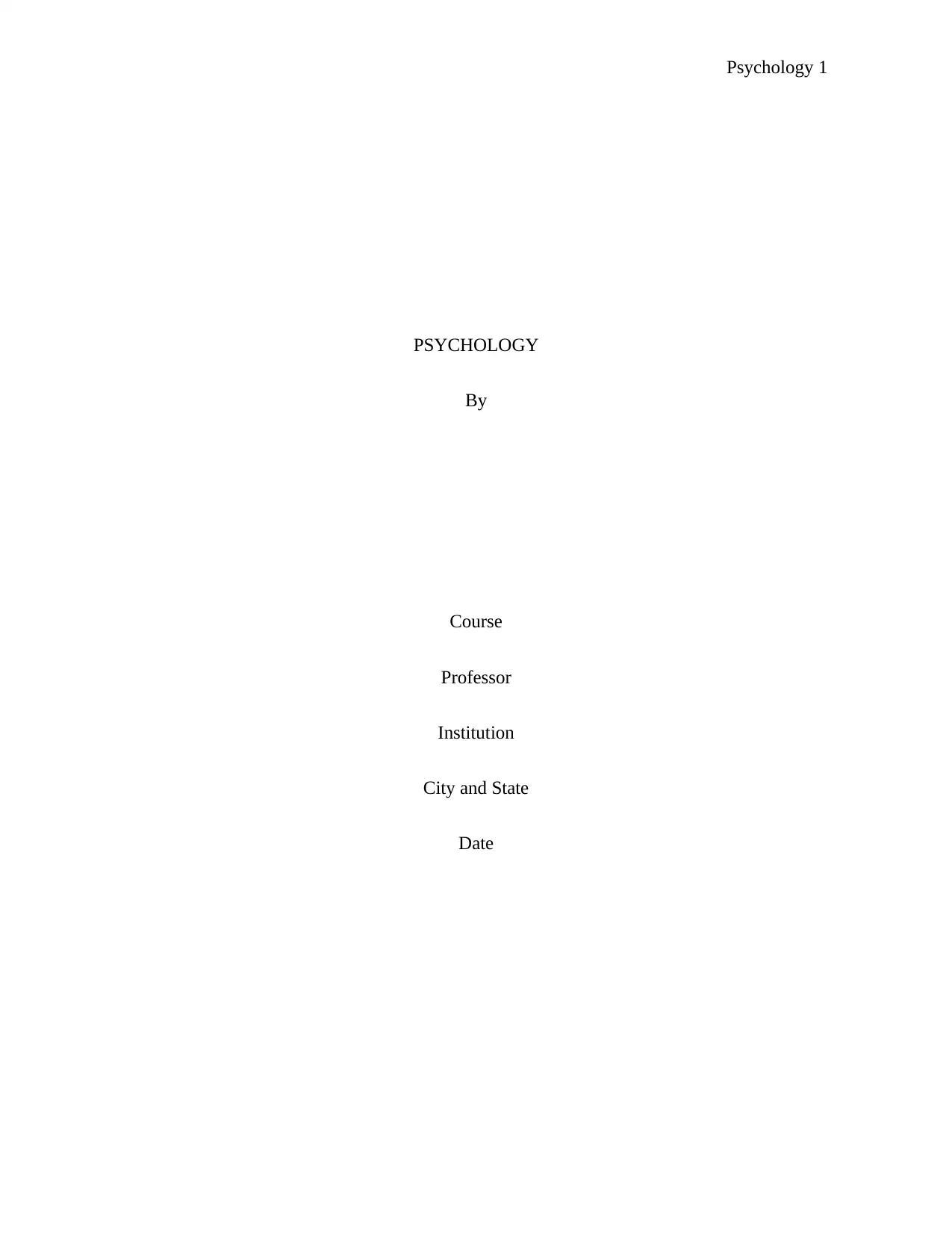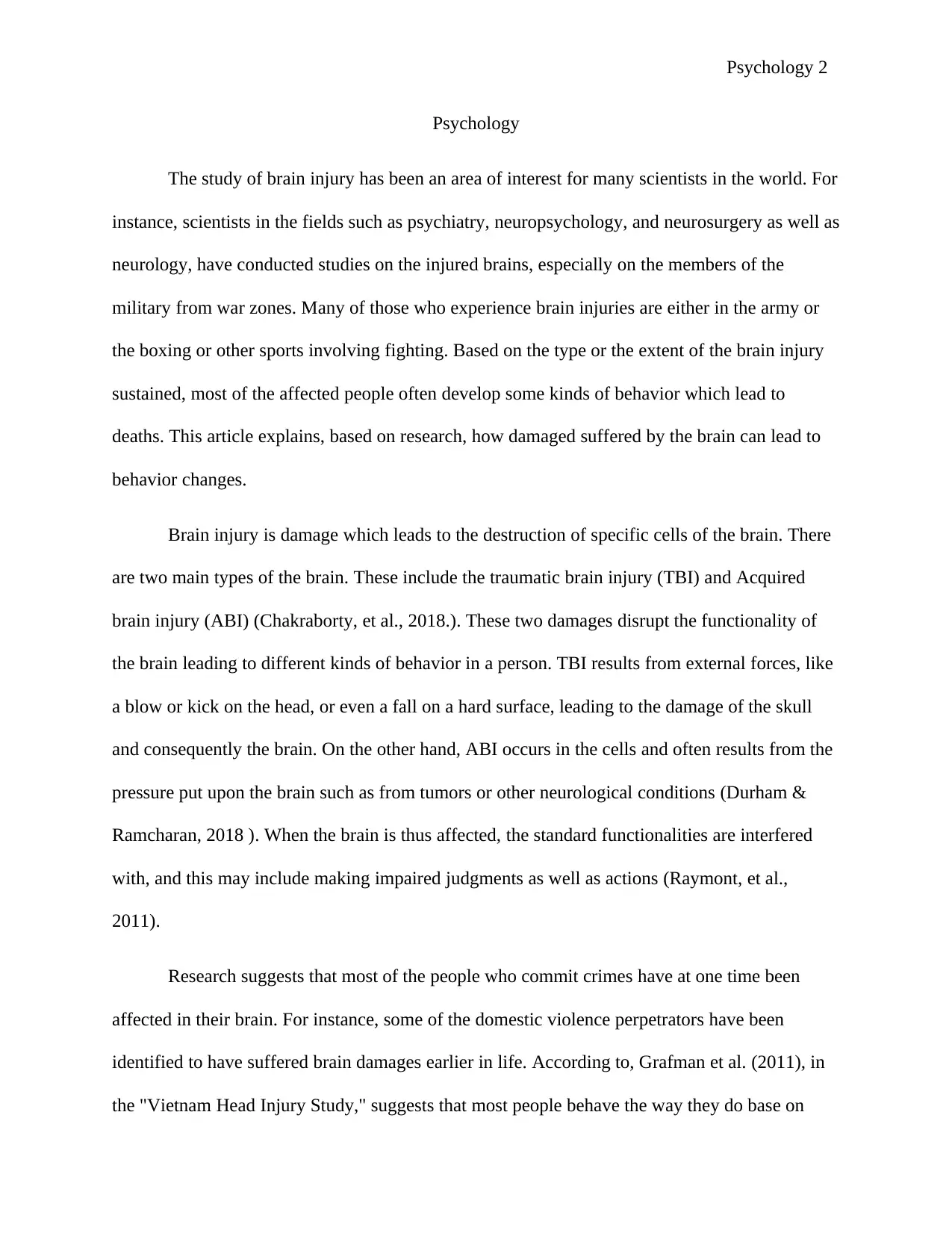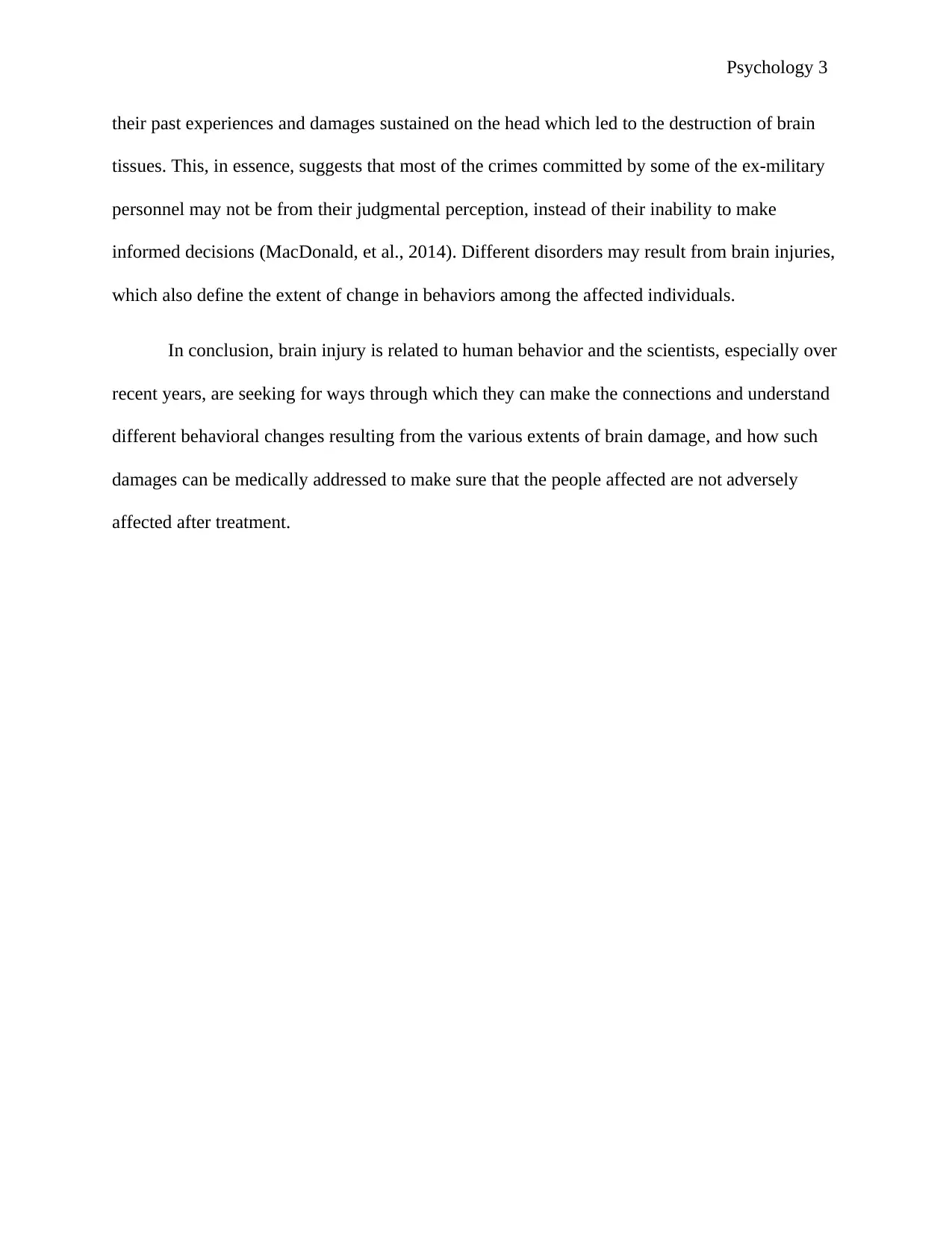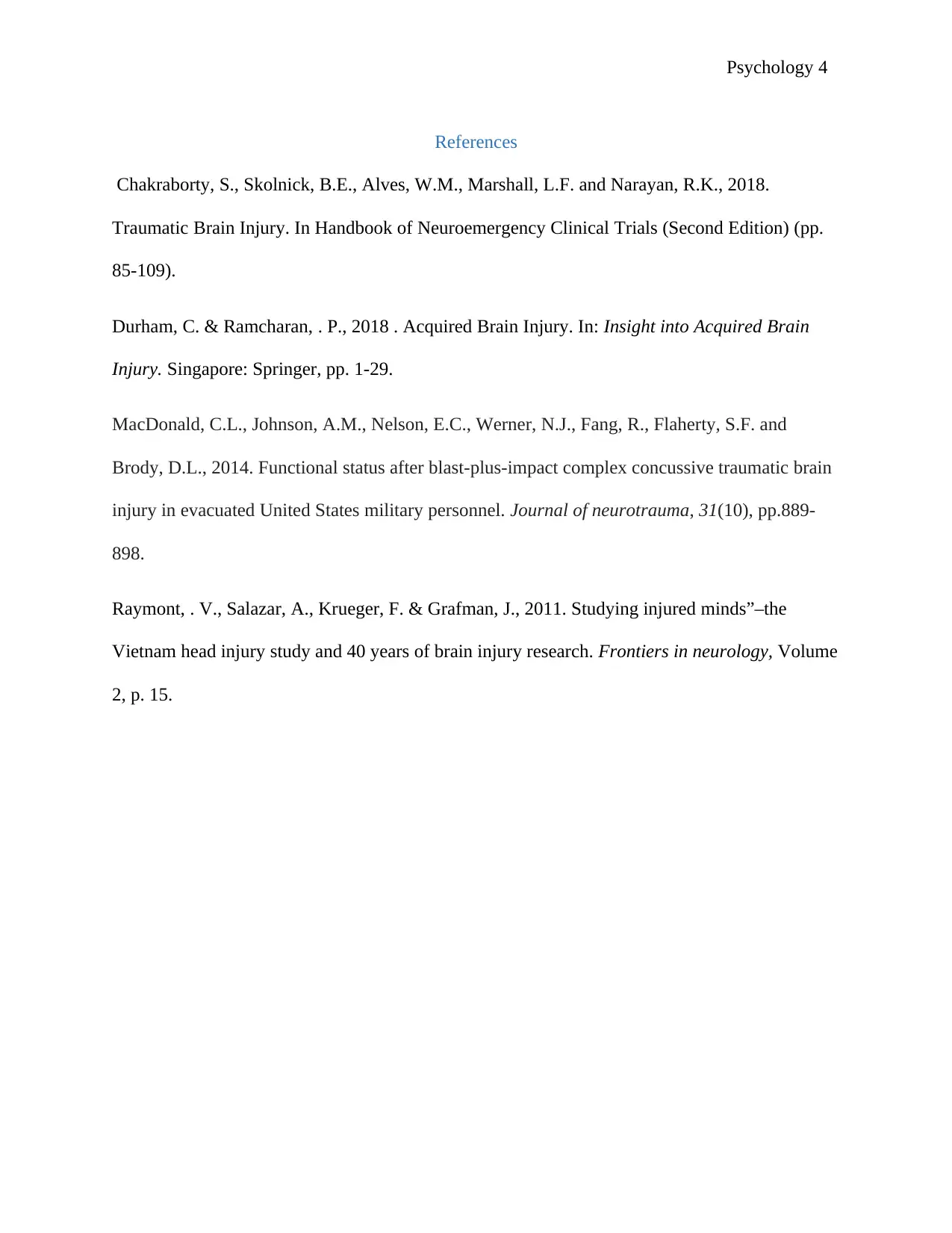The Impact of Brain Injury on Human Behavior: A Psychology Essay
VerifiedAdded on 2023/06/01
|4
|719
|313
Essay
AI Summary
This essay examines the impact of brain injury on human behavior, differentiating between traumatic brain injury (TBI) and acquired brain injury (ABI). It highlights how damage to specific brain cells can disrupt normal functionalities, leading to impaired judgments and actions. The essay references studies on veterans and individuals in contact sports, suggesting that brain damage influences behavior, potentially explaining criminal actions. It concludes by emphasizing the ongoing research seeking to understand the connection between brain injury and behavioral changes, and the development of medical interventions to mitigate adverse outcomes.

Psychology 1
PSYCHOLOGY
By
Course
Professor
Institution
City and State
Date
PSYCHOLOGY
By
Course
Professor
Institution
City and State
Date
Paraphrase This Document
Need a fresh take? Get an instant paraphrase of this document with our AI Paraphraser

Psychology 2
Psychology
The study of brain injury has been an area of interest for many scientists in the world. For
instance, scientists in the fields such as psychiatry, neuropsychology, and neurosurgery as well as
neurology, have conducted studies on the injured brains, especially on the members of the
military from war zones. Many of those who experience brain injuries are either in the army or
the boxing or other sports involving fighting. Based on the type or the extent of the brain injury
sustained, most of the affected people often develop some kinds of behavior which lead to
deaths. This article explains, based on research, how damaged suffered by the brain can lead to
behavior changes.
Brain injury is damage which leads to the destruction of specific cells of the brain. There
are two main types of the brain. These include the traumatic brain injury (TBI) and Acquired
brain injury (ABI) (Chakraborty, et al., 2018.). These two damages disrupt the functionality of
the brain leading to different kinds of behavior in a person. TBI results from external forces, like
a blow or kick on the head, or even a fall on a hard surface, leading to the damage of the skull
and consequently the brain. On the other hand, ABI occurs in the cells and often results from the
pressure put upon the brain such as from tumors or other neurological conditions (Durham &
Ramcharan, 2018 ). When the brain is thus affected, the standard functionalities are interfered
with, and this may include making impaired judgments as well as actions (Raymont, et al.,
2011).
Research suggests that most of the people who commit crimes have at one time been
affected in their brain. For instance, some of the domestic violence perpetrators have been
identified to have suffered brain damages earlier in life. According to, Grafman et al. (2011), in
the "Vietnam Head Injury Study," suggests that most people behave the way they do base on
Psychology
The study of brain injury has been an area of interest for many scientists in the world. For
instance, scientists in the fields such as psychiatry, neuropsychology, and neurosurgery as well as
neurology, have conducted studies on the injured brains, especially on the members of the
military from war zones. Many of those who experience brain injuries are either in the army or
the boxing or other sports involving fighting. Based on the type or the extent of the brain injury
sustained, most of the affected people often develop some kinds of behavior which lead to
deaths. This article explains, based on research, how damaged suffered by the brain can lead to
behavior changes.
Brain injury is damage which leads to the destruction of specific cells of the brain. There
are two main types of the brain. These include the traumatic brain injury (TBI) and Acquired
brain injury (ABI) (Chakraborty, et al., 2018.). These two damages disrupt the functionality of
the brain leading to different kinds of behavior in a person. TBI results from external forces, like
a blow or kick on the head, or even a fall on a hard surface, leading to the damage of the skull
and consequently the brain. On the other hand, ABI occurs in the cells and often results from the
pressure put upon the brain such as from tumors or other neurological conditions (Durham &
Ramcharan, 2018 ). When the brain is thus affected, the standard functionalities are interfered
with, and this may include making impaired judgments as well as actions (Raymont, et al.,
2011).
Research suggests that most of the people who commit crimes have at one time been
affected in their brain. For instance, some of the domestic violence perpetrators have been
identified to have suffered brain damages earlier in life. According to, Grafman et al. (2011), in
the "Vietnam Head Injury Study," suggests that most people behave the way they do base on

Psychology 3
their past experiences and damages sustained on the head which led to the destruction of brain
tissues. This, in essence, suggests that most of the crimes committed by some of the ex-military
personnel may not be from their judgmental perception, instead of their inability to make
informed decisions (MacDonald, et al., 2014). Different disorders may result from brain injuries,
which also define the extent of change in behaviors among the affected individuals.
In conclusion, brain injury is related to human behavior and the scientists, especially over
recent years, are seeking for ways through which they can make the connections and understand
different behavioral changes resulting from the various extents of brain damage, and how such
damages can be medically addressed to make sure that the people affected are not adversely
affected after treatment.
their past experiences and damages sustained on the head which led to the destruction of brain
tissues. This, in essence, suggests that most of the crimes committed by some of the ex-military
personnel may not be from their judgmental perception, instead of their inability to make
informed decisions (MacDonald, et al., 2014). Different disorders may result from brain injuries,
which also define the extent of change in behaviors among the affected individuals.
In conclusion, brain injury is related to human behavior and the scientists, especially over
recent years, are seeking for ways through which they can make the connections and understand
different behavioral changes resulting from the various extents of brain damage, and how such
damages can be medically addressed to make sure that the people affected are not adversely
affected after treatment.
⊘ This is a preview!⊘
Do you want full access?
Subscribe today to unlock all pages.

Trusted by 1+ million students worldwide

Psychology 4
References
Chakraborty, S., Skolnick, B.E., Alves, W.M., Marshall, L.F. and Narayan, R.K., 2018.
Traumatic Brain Injury. In Handbook of Neuroemergency Clinical Trials (Second Edition) (pp.
85-109).
Durham, C. & Ramcharan, . P., 2018 . Acquired Brain Injury. In: Insight into Acquired Brain
Injury. Singapore: Springer, pp. 1-29.
MacDonald, C.L., Johnson, A.M., Nelson, E.C., Werner, N.J., Fang, R., Flaherty, S.F. and
Brody, D.L., 2014. Functional status after blast-plus-impact complex concussive traumatic brain
injury in evacuated United States military personnel. Journal of neurotrauma, 31(10), pp.889-
898.
Raymont, . V., Salazar, A., Krueger, F. & Grafman, J., 2011. Studying injured minds”–the
Vietnam head injury study and 40 years of brain injury research. Frontiers in neurology, Volume
2, p. 15.
References
Chakraborty, S., Skolnick, B.E., Alves, W.M., Marshall, L.F. and Narayan, R.K., 2018.
Traumatic Brain Injury. In Handbook of Neuroemergency Clinical Trials (Second Edition) (pp.
85-109).
Durham, C. & Ramcharan, . P., 2018 . Acquired Brain Injury. In: Insight into Acquired Brain
Injury. Singapore: Springer, pp. 1-29.
MacDonald, C.L., Johnson, A.M., Nelson, E.C., Werner, N.J., Fang, R., Flaherty, S.F. and
Brody, D.L., 2014. Functional status after blast-plus-impact complex concussive traumatic brain
injury in evacuated United States military personnel. Journal of neurotrauma, 31(10), pp.889-
898.
Raymont, . V., Salazar, A., Krueger, F. & Grafman, J., 2011. Studying injured minds”–the
Vietnam head injury study and 40 years of brain injury research. Frontiers in neurology, Volume
2, p. 15.
1 out of 4
Related Documents
Your All-in-One AI-Powered Toolkit for Academic Success.
+13062052269
info@desklib.com
Available 24*7 on WhatsApp / Email
![[object Object]](/_next/static/media/star-bottom.7253800d.svg)
Unlock your academic potential
Copyright © 2020–2026 A2Z Services. All Rights Reserved. Developed and managed by ZUCOL.




